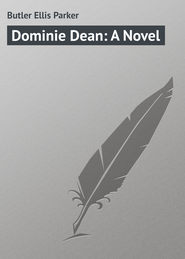По всем вопросам обращайтесь на: info@litportal.ru
(©) 2003-2024.
✖
That Pup
Настройки чтения
Размер шрифта
Высота строк
Поля
“Yes,” said Massett; “and if you knew Fluff as well as we do you would know that he is a dog you can’t shoot. He is a wonderful dog. He knows all about guns. Brownlee tried to make a duck dog out of him, and took him out where the ducks were – showed him the ducks – shot a gun at the ducks – and what do you think that dog learned?”
“To run,” I said, for I had heard about Brownlee teaching Fluff to retrieve. Brownlee blushed.
“Yes,” said Massett, “but that wasn’t all. It doesn’t take intelligence to make a dog run when he sees a gun, but Fluff did not run like an ordinary dog. He saw the gun and he saw the ducks, and he saw that Brownlee only shot at ducks when they were on the wing. And he thought Brownlee meant to shoot him, so what does he do? Stand still? No; he tries to fly. Gets right up and tries to fly. He thought that was what Brownlee was trying to teach him. He couldn’t fly, but he did his best. So whenever Fluff sees a gun, he is on the wing, so to speak. You noticed he was on the wing, didn’t you?”
I told him I had noticed it. I said that as far as I could judge, Fluff had a good strong wing. I said I didn’t mind losing a little thing like a hydrant and a length or two of pipe, but I was glad I hadn’t fastened Fluff to the house – I always liked my house to have a cellar – and it would be just like Fluff to stop flying at some place where there wasn’t any cellar.
“Oh,” said Massett, “he wouldn’t have gone far with the house. A house is a great deal heavier than a hydrant. He would probably have moved the house off the foundation a little, but, judging by the direction Fluff took, the house would have wedged between those two trees, and you would have only lost a piece of the porch, or whatever he was tied to. But the lesson is that you must not try to shoot Fluff unless you are a good wing shot. Unless you can shoot like Davy Crockett, you would be apt to wound Fluff without killing him, and then there would be trouble!”
“Yes,” said Murchison, “the Prevention of Cruelty to Animals folks. There is only one way in which a dog can be killed according to law in this place, and that is to have the Prevention of Cruelty to Animals folks do it. You send them a letter telling them you have a dog you want killed, and asking them to come and kill it. That is according to law.”
“That,” I said firmly, “is what I will do.”
“It won’t do any good,” said Murchison sadly; “they never come. This addition to Gallatin is too far from their offices to be handy, and they never come. I have eighteen deaths for Fluff on file at their offices already, and not one of them has killed him. When you have had as much experience with dogs as I have had you will know that the Prevention of Cruelty to them in this town does not include killing them when they live in the suburbs. The only way a dog can die in the suburbs of Gallatin is to die of old age.”
“How old is Fluff?” I asked.
“Fluff is a young dog,” said Brownlee. “If he had an ordinary dog constitution, he would live fifteen years yet, but he hasn’t. He has an extra strong constitution, and I should say he was good for twenty years more. But that isn’t what we came over for. We came over to learn how you mean to get rid of Fluff.”
“Brownlee,” I said, “I shall think up some way to get rid of Fluff. Getting rid of a dog is no task for a mind like mine. But until he returns and gives me back my hydrant, I shall do nothing further. I am not going to bother about getting rid of a dog that is not here to be got rid of.”
By the time Fluff returned I had thought out a plan. Murchison had never paid the dog tax on Fluff, and that was the same as condemning him to death if he was ever caught outside of the yard, but when he was outside he could not be caught. He was a hasty mover, and little things such as closed gates never prevented him from entering the yard when in haste. When he did not jump over he could get right through a fence. But to a man of my ability these things are trifles. I knew how to get rid of Fluff. I knew how to have him caught in the street without a license. I chained him there.
Brownlee and Massett and Murchison came and watched me do it. Our street is not much used, and the big stake I drove in the street was not much in the way of passing grocery delivery wagons. I fastened Fluff to the stake with a chain, and then I wrote to the city authorities and complained. I said there was a dog without a license that was continually in front of my house, and I wished it removed; and a week or so later the dog-catcher came around and had a look at Fluff: He walked all around him while Massett and Brownlee and Murchison and I leaned over our gates and looked on. He was not at all what I should have expected a dog-catcher to be, being thin and rather gentlemanly in appearance; and after he had looked Fluff over well he came over and spoke to me. He asked me if Fluff was my dog. I said he was.
“I see!” said the dog-catcher. “And you want to get rid of him. If he was my dog, I would want to get rid of him, too. I have seen lots of dogs, but I never saw one that was like this, and I do not blame you for wanting to part with him. I have had my eye on him for several years, but this is the first opportunity I have had to approach him. Now, however, he seems to have broken all the dog laws. He has not secured a license, and he is in the public highway. It will be my duty to take him up and gently chloroform him as soon as I make sure of one thing.”
“Tell me what it is,” I said, “and I will help you make sure of ft.”
“Thank you,” he said, “but I will attend to it,” and with that he got on his wagon and drove off. He returned in about an hour.
“I came back,” he said, “not because my legal duty compels me, but because I knew you would be anxious. If I owned a dog like that, I would be anxious, too. I can’t take that dog.”
“Why not?” we all asked.
“Because,” he said, “I have been down to the city hall, and I have looked up the records, and I find that the streets of this addition to the city have not been accepted by the city. The titles to the property are so made out that until the city legally accepts the streets, each property owner owns to the middle of the street fronting his property. If you will step out and look, you will see that the dog is on your own property.”
“If that is all,” I said, “I will move the stake. I will put him on the other side of the street.”
“If you would like him any better there,” said the dog-catcher, “you can move him, but it would make no difference to me. Then he would be on the private property of the man who owns the property across the street.”
“But, my good man,” I said, “how is a man to get rid of a dog he does not want?”
The dog-catcher frowned.
“That,” he said, “seems to be one of the things our lawmakers have not thought of. But whatever you do, I advise you to be careful. Do not try any underhand methods, for now that my attention has been called to the dog, I shall have to watch his future and see that he is not badly used. I am an officer of the Prevention of Cruelty to Animals as well as a dog-catcher, and I warn you to be careful what you do with that dog.”
Then he got on his wagon again and drove away.
The next morning I was a nervous wreck, for Fluff had howled all night, and Murchison came over soon after breakfast. He was accompanied by Brownlee and Massett.
“Now, I am the last man in the world to do anything that my neighbors would take offense at,” he said, as soon as they were seated on my porch, “and Brownlee and Massett love dogs as few men ever love them; but something has to be done about Fluff. The time has come when we must sleep with our windows open, and neither Massett nor Brownlee nor I got a minute of sleep last night.”
“Neither did I,” I said.
“That is different entirely,” said Murchison. “Fluff is your dog, and if you want to keep a howling dog, you would be inclined to put up with the howl, but we have no interest in the dog at all. We do not own him, and we consider him a nuisance. We have decided to ask you to get rid of him. It is unjust to your neighbors to keep a howling dog. You will have to get rid of Fluff.”
“Exactly!” said Massett. “For ten nights I have not slept a wink, and neither has Murchison, nor has Brownlee – ”
“Nor I,” I added.
“Exactly!” said Massett. “And four men going without sleep for ten nights is equal to one man going without sleep forty nights, which would kill any man. Practically, Fluff has killed a man, and is a murderer, and as you are responsible for him, it is the same as if you were a murderer yourself; and as you were one of the four who did not sleep, you may also be said to have committed suicide. But we do not mean to give you into the hands of the law until we have remonstrated with you. But we feel deeply, and the more so because you could easily give us some nights of sleep in which to recuperate.”
“If you can tell me how,” I said, “I will gladly do it. I need sleep more at this minute than I ever needed it in my life.”
“Very well,” said Massett; “just get out your shotgun and show it to Fluff. When he sees the gun he will run. He will take wings like a duck, and while he is away we can get a few nights’ rest. That will be something. And if we are not in good condition by that time, you can show him the shotgun again. Why!” he exclaimed, as he grew enthusiastic over his idea, “you can keep Fluff eternally on the wing!”
I felt that I needed a vacation from Fluff. I unchained him and went in to get my shotgun. Then I showed him the shotgun, and we had two good nights of sleep. After that, whenever we felt that we needed a few nights in peace, I just showed Fluff the shotgun and he went away on one of his flying trips.
But it was Brownlee – Brownlee knew all about dogs – who first called my attention to what he called the periodicity of Fluff.
“Now, you would never have noticed it,” he said one day when Murchison and I were sitting on my porch with him, “but I did. That is because I have studied dogs. I know all about dogs, and I know Fluff can run. This is because he has greyhound blood in him. With a little wolf. That is why I studied Fluff, and how I came to notice that every time you show him the shotgun he is gone just forty-eight hours. Now, you go and get your shotgun and try it.”
So I tried it, and Fluff went away as he always did; and Brownlee sat there bragging about how Fluff could run, and about how wonderful he was himself to have thought of the periodicity of Fluff.
“Did you see how he went?” he asked enthusiastically. “That gait was a thirty-mile-an-hour gait. Why, that dog travels – he travels – ” He took out a piece of paper and a pencil and figured it out. “In forty-eight hours he travels fourteen hundred and forty miles! He gets seven hundred and twenty miles from home!”
“It doesn’t seem possible,” said Murchison. “No,” said Brownlee frankly, “it doesn’t.” He went over his figures again. “But that is figured correctly,” he said. “If – but maybe I did not gauge his speed correctly. And I didn’t allow for stopping to turn around at the end of the out sprint. What we ought to have on that dog is a pedometer. If I owned a dog like that, the first thing I would get would be a pedometer.”
I told Brownlee that if he wished I would give him Fluff, and he could put a pedometer, or anything else, on him; but Brownlee remembered he had some work to do and went home.
But he was right about the periodicity of Fluff. Almost on the minute at the end of forty-eight hours Fluff returned, and Brownlee and Murchison, who were there to receive him, were as pleased as if Fluff had been going away instead of returning.
“That dog,” said Brownlee, “is a wonderful animal. If Sir Isaac Newton had that dog, he would have proved something or other of universal value by him. That dog is plumb full of ratios and things, if we only knew how to get them out of him. I bet if Sir Isaac Newton had had Fluff as long as you have had him he would have had a formula all worked out – x/y(2xz-dog)=2(4ab-3x) or something of that kind, so that anyone with half a knowledge of algebra could figure out the square root of any dog any time of the day or night. I could get up a Law of Dog myself if I had the time, with a dog like Fluff to work on. ‘If one dog travels fourteen hundred and forty miles at the sight of a gun, how far would two dogs travel?’ All that sort of thing. Stop!” he ejaculated suddenly. “If one dog travels forty-eight hours at the sight of one gun, how far would he travel at the sight of two guns? Murchison,” he cried enthusiastically, “I’ve got it! I’ve got the fundamental law of periodicity in dogs! Go get your gun,” he said to me, “and I will get mine.”
He stopped at the gate long enough to say:
“I tell you, Murchison, we are on the verge of a mighty important discovery – a mighty important discovery! If this thing turns out right, we will be at the root of all dog nature. We will have the great underlying law of scared dogs.”
He came back with his shotgun carefully hidden behind him, and then he and I showed Fluff the two guns simultaneously. For one minute Fluff was startled. Then he vanished. All we saw of him as he went was the dust he left in his wake. Massett had come over when Brownlee brought over his gun, and Murchison and I sat and smoked while Massett and Brownlee fought out the periodicity of Fluff. Brownlee said that for two guns Fluff would traverse the same distance as for one, but twice as quickly; but Massett said Brownlee was foolish, and that anyone who knew anything about dogs would know that no dog could go faster than Fluff had gone at the sight of one gun. Massett said Fluff would travel at his regular one-gun speed, but would travel a two-gun distance. He said Fluff would not be back for ninety-six hours. Brownlee said he would be back in forty-eight hours, but both agreed that he would travel twenty-eight hundred and eighty miles. Then Murchison went home and got a map, and showed Brownlee and Massett that if Fluff traveled fourteen hundred miles in the direction he had started he would have to do the last two hundred miles as a swim, because he would strike the Atlantic Ocean at the twelve hundredth mile. But Brownlee just turned up his nose and sneered. He said Fluff was no fool, and that when he reached the coast he would veer to the north and travel along the beach for two hundred miles or so. Then Massett said that he had been thinking about Brownlee’s theory, and he knew no dog could do what Brownlee said Fluff would do – sixty miles an hour. He said he agreed that a dog like Fluff could do thirty miles an hour if he did not stop to howl, because his howl represented about sixty horse power, but that no dog could ever do sixty miles an hour. Then Brownlee got mad and said Massett was a born idiot, and that Fluff not only could do sixty miles, but he could keep on increasing his speed at the rate of thirty miles per gun indefinitely. Then they went home mad, but they agreed to be on hand when Fluff returned. But they were not. Fluff came home in twenty-four hours, almost to the minute.
When I went over and told Brownlee, he wouldn’t believe it at first, but when I showed him Fluff, he cheered up and clapped me on the back.
“I tell you,” he exclaimed, “we have made a great discovery. We have discovered the law of scared dogs. ‘A dog is scared in inverse ratio to the number of guns!’ Now, it wouldn’t be fair to try Fluff again without giving him a breathing spell, but to-morrow I will come over, and we will try him with four guns. We will work this thing out thoroughly,” he said, “before we write to the Academy of Science, or whatever a person would write to, so that there will be no mistake. Before we give this secret to the world we want to have it complete. We will try Fluff with any number of guns, and with pistols and rifles, and if we can get one we will try him with a cannon. We will keep at it for years and years. You and I will be famous.”
I told Brownlee that if he wanted to experiment for years with Fluff he could have him, but that all I wanted was to get rid of him; but Brownlee wouldn’t hear of that. He said he would buy Fluff of me if he was rich enough, but that Fluff was so valuable he couldn’t think of buying him. He would let me keep him. He said he would be over the next day to try Fluff again.
So the next day he and Murchison and Massett came over and held a consultation on my porch to decide how many guns they would try on Fluff. They could not agree. Massett wanted to try four guns and have Fluff absent only half a day, but Brownlee wanted to have me break my shotgun in two and try that on Fluff. He said that according to the law of scared dogs, a half a gun, working it out by inverse ratio, would keep Fluff away for twice as long as one gun, which would be ninety-six hours; and while they were arguing it out Fluff came around the house unsuspectingly and saw us on the porch. He gave us one startled glance and started north by northeast at what Brownlee said was the most marvelous rate of speed he ever saw. Then he and Massett got down off the porch and looked for guns, but there were none in sight. There wasn’t anything that looked the least like a gun. Not even a broomstick. Brownlee said he knew what was the matter – Fluff was having a little practice run to keep in good condition, and would be back in a few hours; but, judging by the look he gave us as he went, I thought he would be gone longer than that.











